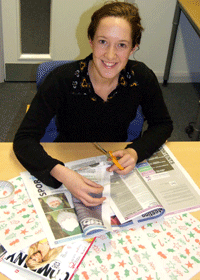Top 10 tips for a more sustainable Christmas
17/12/07
Top 10 tips for a more sustainable Christmas
 The festive season doesn’t have to be about producing tonnes of rubbish or collecting hoards of plastic bags, according to Hannah Smith from Kingston University’s Sustainability Team.Â
The festive season doesn’t have to be about producing tonnes of rubbish or collecting hoards of plastic bags, according to Hannah Smith from Kingston University’s Sustainability Team.Â
“There’s plenty individuals can do to reduce the impact they have on the environment from sending e-cards to trying out second-life packaging to wrap up their gifts,†she said.
Here Hannah offers her top 10 tips for a greener Christmas.
1. Never leave the house without a bag for life around Christmas time
Stocking fillers will catch your eye on the lead up to the big day and unplanned shopping can lead to carrier bag mayhem.
If you get into the habit of keeping a small fold up re-usable bag with you in your pocket or handbag, you won’t have to accept another plastic bag.
2. Try using second-life packaging
Be original when it comes to wrapping your Christmas presents and re-use something you don’t need.
Newspapers with meaningful features, colourful magazines and even old curtains or fabrics will stand out from the crowd under the tree.
Not only will you give the materials a short-lived second life, you’ll also save a bit of money on wrapping paper.
3. Send an e-card
The Christmas card tradition no longer has to mean deforestation with the technological advancement of e-cards.
You can personalise your season’s greetings and send a little line to explain why you have opted for e-cards this year.
If you do use the paper version, then make sure you choose a brand approved by the Forestry Stewardship Council, which only use paper pulp from sustainably managed forests.
For more information, visit www.fsc-uk.org.
4. Add energy saving light bulbs or green gadgets to your Secret Santa
Buy your colleagues energy saving light bulbs or mini home compost kits for a sure Secret Santa winner.
Most people haven’t got round to green friendly gadgets yet, even though they’d love to try them out so this way there’s no excuse not to get the gifts straight into action.
5. Recycle your Christmas waste
Christmas produces an extra three million tonnes of rubbish in the United Kingdom most of which comes from wrapping paper and cards.
Don’t forget that this type of waste is highly recyclable.
Whether you re-use the cards and paper for next year’s green Christmas or you separate it all for your home collection, there will be a phenomenal amount that you can recycle to stop it sitting in the ground for hundreds of years. Â
6. Choose a green Christmas tree
The Soil Association and the Forestry Stewardship Council have teamed up to approve sustainably managed Christmas tree farms from across the United Kingdom.
You can find your local farm in the Soil Association’s directory at www.soilassociation.org.
Don’t forget to treat your old tree as organic recyclable waste.
Most local authorities will run a Christmas tree collection scheme in January.
7. Choose organic wine
Impress your family and friends around the dinner table with your taste in green friendly drinks - organic wines, organic ales or even bottles brewed on home turf.
You can even choose both at www.englishorganicwine.co.uk, and sup from a glass of locally produced wine made without the pesticides. Â
8. Have a vegetarian Christmas dinner
A vegetarian diet is now deemed to be up to eight times more environmentally, economically and financially sustainable than a meat diet.
Make a New Year’s resolution to cut out one meat or fish meal per week and go veggie.
Try a caramelised butternut squash with maple syrup and red onion and warm nut stuffing for something different on your plate this year.
9. Take time to shop
Why not find out a little bit extra about what you’re buying and where it comes from.
Rather than spending your hard earned money on random gifts and food which have been flown to the United Kingdom, visit a local butcher or farmers’ market and ask the stall holders about where their products are from.
Support the United Kingdom’s farmers and save yourself money, while cutting down on the carbon used in getting your food from field to table.
For more information, visit www.farmersmarkets.net.
10. Christmas cheer
Remember to talk this Christmas.
Talk about the weather, talk about the world and listen to opinions and new information.
Remember that we have the opportunity to make a better life for ourselves and our future generations.
Eco living is about self improvement and reflection.